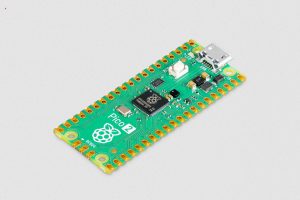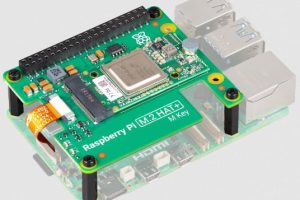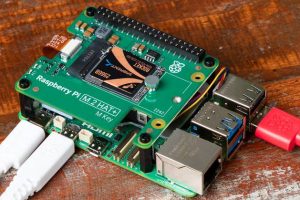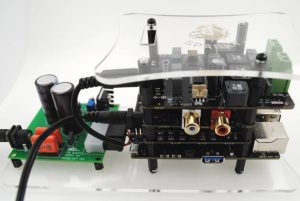
Created at its Bangalore design centre, it has multiple options – in the photo, from the top, are: 2x50W stereo amplifier, DAC+headphone amplifier, re-clocker and the firm’s own Sparky single-board computer at the bottom in place of a Raspberry Pi. To the left is a power supply ripple reducer.
The design’s audio semiconductors are something of a Texas Instruments fest.
Dubbed ‘Volt’, the amplifier is an analogue-in design based around a TI TPA3118 Class-D amplifier IC. This takes its inputs from the board below, although a stand-alone version called Volt+ with separate RCA inputs is also available.
The firm is claiming 102dB signal/noise, and the output bridges can drive loads from 4 to 8Ω, from rails up to 24V. All output filter inductors are included.
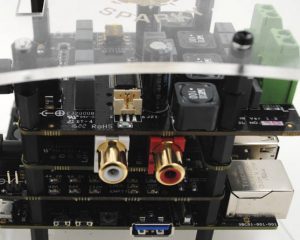 Three versions of DAC board are available: Piano 2.1, Piano 1.1, and the gloriously named ‘Cheapo DAC’.
Three versions of DAC board are available: Piano 2.1, Piano 1.1, and the gloriously named ‘Cheapo DAC’.
Piano 2.1 centres on a pair of PCM5142 DACs (384kHz, 32bit, 112dB s/n, -93dB THD+N at -1dBfull-scale), which have integrated DSP.
“Software from TI is available for download, and can be used to create specific filters and other audio functions,” said Allo. “The board will come pre-programed as a 2.1 [stereo + sub-woofer] output, but you can create your own custom design and load it the board and can access the cross-over frequency directly from linux.” – the last bit is via an app from Allo.
Digital and analogue circuits have separate regulation, with the analogue side getting low-noise LT3042s from Linear Tech. More analogue care comes through the use of thin film resistors and polymer capacitors in the signal path.
According to the firm, the board auto-configures through an on-board EEPROM.
Even the Cheapo DAC has 8-192kHz sampling (>98dB s/n, <-80dB THD), plus a TPA6133A2 headphone amplifier (138mW, 93dB s/n, 109dB PSRR) and an optical (Toslink) SPDIF output.
Re-clocking – scrubbing jitter from the processor-derived digital audio signal – is something normally found at the high-end audio equipment.
Allo’s re-clocker board is called Kali, after the goddess of time.
“Every single-board computer has a crystal that it used to send digital signals to your DACs,” said Allo. “The accuracy of this crystal is very important in how well the DAC will transform the digital signal into analogue sounds. Most use a very cheap crystal with lots of jitter in order to save cost.”
Kali’s output clock is based on a low-jitter crystal from Nihon Dempa Kogyo (NDK), isolated from the world by a low-noise regulator.
Re-timing is through a Lattice FPGA with 4Mbit FIFO RAM which buffers 700ms of audio.
“Since FPGAs introduce about 200ps of jitter, the NDKs it re-clock the buffered data outside the FPGA and provide an almost jitter-free clock to your DAC,” claimed Allo.
The board actually has two clocks, one for 44.1kHz sampling (wave files) and one for 48kHz (streamed music).
16, 24 and 32bit I2S inputs across 44.1, 48, 88.2, 96, 176.4 and 192kHz sample rates can be re-timed to a cleaned I2S output, with word length and sample rate auto-selector by the board.
Despite what some documents on the web say, there is only one version of Kali, for: Raspberry Pi, Allo’s own Raspberry Pi-like Sparky (quad core Cortex-A9), and other Raspberry Pi clones. At one time there were plans for two version of Kali.
The last part of the set-up is a ‘capacitance multiplier’ linear ripple reducing circuit whose output is the input voltage (6-30V) minus much of its ripple and a drop-out.
Residual ripple is claimed to be under 5mV up to 1MHz with a power supply rejection ratio (PSRR) of 70dB. Drop-out can be trimmed across 0-3V depending how much input ripple is expected.
The boards are close to release, an Allo spokesman told Electronics Weekly.
More:
Raspberry Pi Hi-Fi amplifier/DAC includes jitter re-timing
Hi-Fi system for Raspberry Pi and clones arrives at EW Towers
Sparky Hi-Fi boot attempt not going so well
Sparky up and running – hi-fi next
Allo RasPi clone hi-fi sounds great
 Electronics Weekly Electronics Design & Components Tech News
Electronics Weekly Electronics Design & Components Tech News
